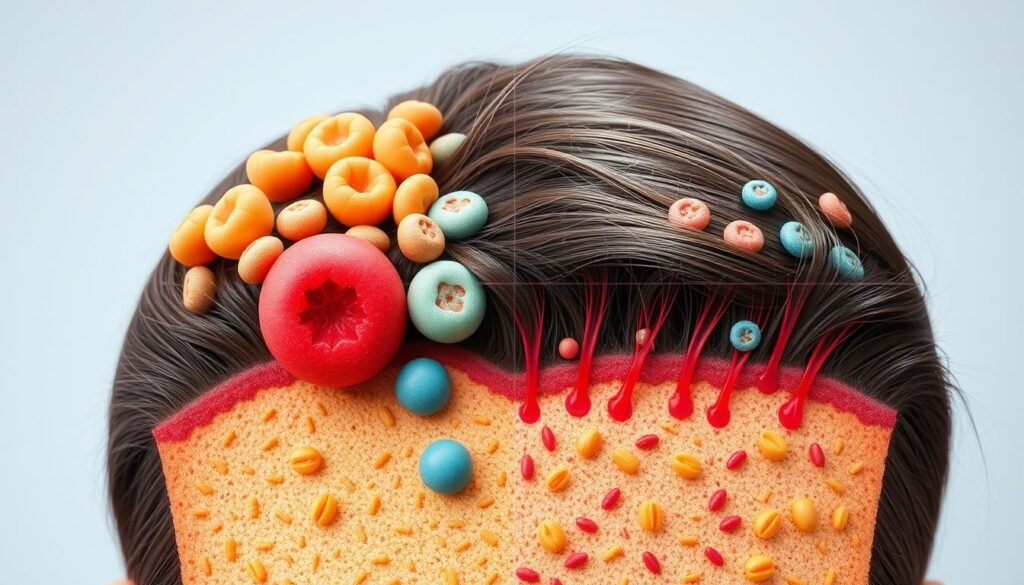Did you know that less than 0.1% of patients taking amlodipine experience hair loss? This fact is quite surprising. It shows how concerned some people are about amlodipine and hair loss. Many people use amlodipine to treat high blood pressure and heart problems. As its use grows, so do questions about its side effects, especially regarding hair loss.
Even though hair loss is rare, these reports have sparked interest. People want to understand if there is a link to their health. This article will look into how amlodipine might affect hair health. We encourage everyone to talk to health professionals for advice. Learning about the side effects can help clear up worries about this common drug. It lets patients choose their treatments wisely. For further information, check out this insightful article.
Key Takeaways
- Amlodipine is mainly used for hypertension and heart-related issues.
- Hair loss from amlodipine is uncommon but raises concerns.
- It’s crucial to understand medication effects on hair health for wise decisions.
- Consulting with healthcare providers is advisable for addressing side effects.
- Blood flow changes could explain amlodipine’s link to hair loss.
- Patients noticing hair loss should actively seek solutions.
Introduction to Amlodipine and Its Uses
Amlodipine is known as a calcium channel blocker. It’s mainly used to treat high blood pressure or hypertension. This medicine is crucial for dealing with amlodipine and cardiovascular conditions like coronary artery disease and angina, which causes chest pain. Amlodipine helps by making blood vessels wider and more relaxed. This improves blood flow and decreases the heart’s workload. As a result, it lowers blood pressure and cuts down the risk of health issues.
One important use of amlodipine is in treating children. Doctors can prescribe it to kids as young as 6 for certain conditions, but with care. Adults usually start with a dose of 5 mg once a day. This can go up to 10 mg if needed. For kids and teens from 6 to 17, the recommended dose is 5 mg daily. Another good thing about amlodipine is that you can take it with or without food.
It’s key for patients to keep an eye on their blood pressure while on this medication. To get the best results, amlodipine may be used with other drugs. This is especially true for about 30% of people with high blood pressure that’s hard to control.
For those looking for details on possible side effects of amlodipine, click here to read more.
To wrap it up, knowing how amlodipine works is very important. It helps patients and doctors talk about the risks and benefits. This understanding is essential for managing health better.
The Connection Between Amlodipine and Hair Loss
Amlodipine is often used to treat high blood pressure and heart-related issues. Yet, it has been linked to hair loss in some cases. For those worried about losing hair due to amlodipine, understanding this connection is key.
Understanding Reported Cases of Hair Loss
The relationship between amlodipine and hair loss isn’t well-documented. The risk seems low, but hair loss can result from many factors, including genetics and lifestyle. Despite few reports, it’s wise to stay alert. Some research suggests that medications affecting blood flow might influence hair health. For further details, check out this link.
Is Hair Loss a Common Side Effect?
Hair loss due to amlodipine isn’t common. It happens rarely, in about 1 out of 100 users. Side effects more often include headaches and dizziness. A condition called telogen effluvium might link to amlodipine, leading to more hair loss. It’s important to know all possible side effects if you’re using or thinking about using this medication.
| Side Effect Type | Occurrence Rate | Severity |
|---|---|---|
| Common | Affects up to 1 in 10 people | Headache, dizziness, fatigue |
| Uncommon | Affects up to 1 in 100 people | Mood changes, anxiety, hair loss |
| Rare | Affects up to 1 in 1,000 people | Serious allergic reactions |
| Very Rare | Affects up to 1 in 10,000 people | Decreased white blood cells |
Amlodipine Cause Hair Loss: The Evidence
The link between amlodipine and hair loss is getting attention. This is because of its potential impacts on hair health. The core reasons behind it are not fully understood yet. But, a couple of things might explain it. For one, amlodipine could impact blood flow and might even influence nitric oxide production. This could lead to changes in amlodipine hair follicles.
Mechanisms of Action and Potential Impact on Hair Follicles
Studies have found that drugs like amlodipine might upset the hormonal balance in the scalp. This disturbance could raise levels of a hormone called dihydrotestosterone (DHT), which is known for its role in hair loss like in male pattern baldness. About 1.38% of amlodipine users have reported hair loss. Knowing how this happens helps us understand the effects on amlodipine hair follicles.
Factors Influencing Hair Loss in Patients on Amlodipine
Many factors can cause hair loss in patients taking amlodipine. Age is a big one, with people over 60 seeing more hair loss after taking the drug for years. Other things to think about include existing health issues and other medicines which might make hair loss worse. Some studies suggest that hair loss with amlodipine might not last forever, but experiences can vary a lot.

| Factor | Impact on Hair Loss |
|---|---|
| Age | Increased risk of hair loss in older patients |
| Health Conditions | Existing conditions may intensify hair loss |
| Concurrent Medications | Other drugs can influence hair loss rates |
| Duration of Use | Long-term use raises likelihood of hair loss |
| Hormonal Balance | Can disrupt normal DHT levels, affecting hair growth |
It’s key for patients worried about their hair health while on amlodipine to know about these factors. Being aware of the potential impacts on hair health encourages them to talk with their doctors. They can look for ways to watch for hair loss or discuss other options if it happens.
Common Side Effects of Amlodipine
Amlodipine helps treat high blood pressure and chronic angina effectively. It has some side effects, but most people tolerate it well. Knowing the difference between mild and severe side effects is key. This knowledge helps patients seek help when it’s needed.
Mild Side Effects Versus Severe Reactions
Some common mild side effects are:
- Dizziness
- Peripheral edema (swelling)
- Fatigue
- Nausea
While these symptoms are usually manageable, severe reactions can occur. These include liver damage and severe allergic reactions. Thankfully, such serious side effects are rare. Still, staying vigilant is important.
Long-Term Risks Associated with Amlodipine
It’s crucial to be aware of potential risks if you’re on amlodipine long-term. Keeping an eye on your health is a wise move. This is because new symptoms can appear over time or existing ones might get worse.
For example, liver issues can show up as upper stomach pain, jaundice, or dark-colored urine. Older adults might face a higher risk of severe reactions. They should talk to their healthcare providers about any worries.
Understanding amlodipine side effects is important for managing your treatment. Since some side effects can get serious over time, talking to your doctors is vital. They will help you get the best care possible. For more health tips, check out this resource.

Hair Loss Mechanisms Associated with Medications
It’s crucial to know how meds can lead to hair loss for those seeing unexpected changes. Drug-induced hair loss can happen in several ways, mainly telogen effluvium and anagen effluvium. Learning about these mechanisms helps us understand the link between specific drugs, like amlodipine, and hair loss.
Understanding Telogen Effluvium
Telogen effluvium causes many hair follicles to enter the resting phase, leading to noticeable shedding. This may be triggered by various stressors, such as taking certain meds. Signs usually show up a few weeks to months after the cause. Although amlodipine is not often linked with this condition, knowing about telogen effluvium is important. It shows how certain drugs can affect hair growth cycles. For details on hair loss types, check out this page.
Anagen Effluvium: What You Should Know
Anagen effluvium is a severe type of hair loss that happens during the growth phase. It appears quickly, within days or weeks, after starting certain meds, like chemotherapy. While there’s anecdotal evidence that amlodipine might cause severe hair loss, its exact mechanism is less understood. Lifestyle and genetic factors also play a role in medication-related hair loss.

| Hair Loss Mechanism | Timing | Common Triggers |
|---|---|---|
| Telogen Effluvium | Weeks to months | Stress, medication changes |
| Anagen Effluvium | Days to weeks | Chemotherapy, intense medications |
How Amlodipine Affects Blood Flow and Hair Health
Amlodipine primarily works as a calcium channel blocker, greatly affecting blood flow. This medicine widens blood vessels, enhancing circulation to key organs. This doesn’t only impact the heart but also reaches hair follicles.
Sometimes, increased blood flow helps vital body parts but might reduce flow to hair follicles. If hair roots don’t get enough blood, they can’t stay healthy or grow well. Knowing the effects of amlodipine on hair health is crucial for those seeing changes in their hair.
Moreover, studies reveal that hair issues in amlodipine users are pretty rare, under 1%. Yet, the tie between better circulation and hair health is still important to study. Understanding this could help people looking at amlodipine treatment make informed choices about their hair care.
Managing Hair Loss: Prevention and Treatment Options
If you’re losing hair from taking amlodipine, finding the right solutions is key. Look into medication adjustments or hair growth alternative treatments. It’s a team effort with doctors to find what works for you.
Adjusting Dosage or Switching Medications
Often, stopping hair loss caused by amlodipine means changing the dose. Doctors might lower it or suggest a different drug with fewer side effects. It’s important to talk openly about what you’re going through, so you get a plan that fits.
Alternative Treatments for Hair Growth
For stronger hair, consider other treatments too. Options include:
- Topical minoxidil, which boosts hair growth.
- Supplements with biotin, zinc, and omega fats.
- Laser therapy to improve scalp health.
Combine these with medication adjustments after talking to a doctor. Every person is different, so finding what helps you best is important.
Discussing Concerns with Healthcare Providers
Talking openly with your healthcare team is key to handling health issues, especially concerns about amlodipine side effects. These may include problems like hair loss during treatment. An amlodipine side effects discussion helps you get useful advice and support for your specific situation.
It’s important to tell your doctor about any side effects. Discuss any symptoms or changes you’ve noticed since starting amlodipine. This lets your doctor check your condition carefully, recommend tests, and look for other reasons for hair loss or other symptoms.
Doctors can also provide reassurance during your consultation. They consider risks tied to your age, medical history, and lifestyle. This helps you make choices about your care. Regular check-ins help track how well the medication works. They also let doctors change doses or suggest other treatments if needed.
Conclusion
The link between amlodipine and hair loss is not straightforward. Although some people report hair loss with amlodipine, it’s not common. The reasons might include changes in blood flow or hormone levels. It’s also useful to understand hair growth cycles to see how medicines could impact hair.
For most, amlodipine’s benefits in treating heart and blood pressure issues outweigh its risks. But, it’s good to watch for any hair changes once you start it. If you notice hair thinning, talk to your doctor. They can help decide if amlodipine is right for you. Checking the information on amlodipine and hair loss can also help make informed treatment choices.
Choosing what’s best involves considering overall health, genes, and how you live. This way, you can look after both your heart health and hair needs. Taking a whole-person approach is key to staying well.